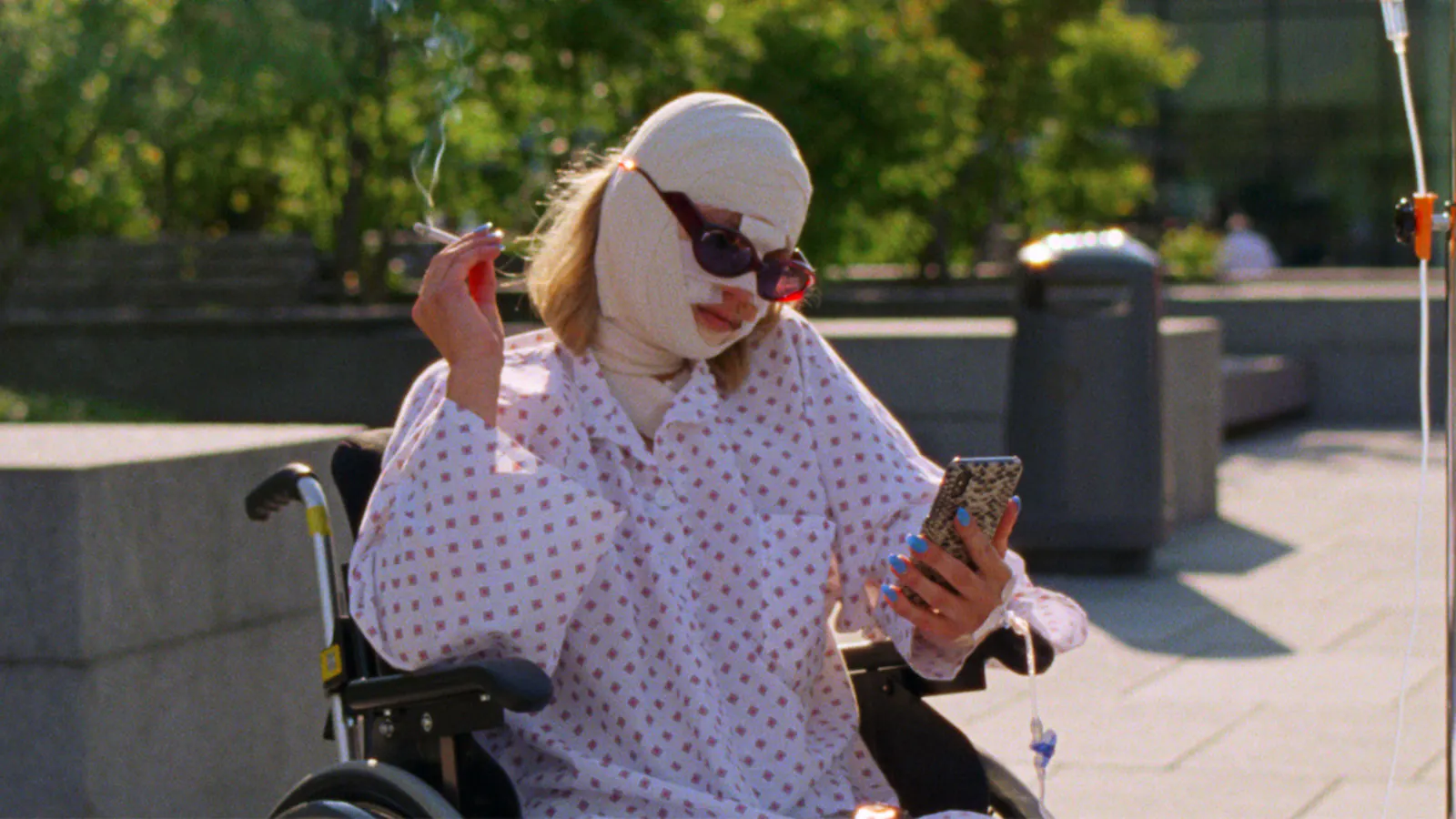If one surveyed most audiences and asked them to point to the premier purveyor of scathing Scandi social satire, they would immediately choose Sweden’s Ruben Östlund. Östlund’s semi-sincere work does scratch at hypocrisy; but there is a Norwegian trickster, Kristoff Borgli, who is at this moment, far less famous, but soon to be a household name with his upcoming Dream Scenario starring Nicolas Cage. Borgli’s Sick of Myself isn’t his first film but it is perhaps the best recognised outside of Europe for a very good reason. It’s unpleasant, hilarious, a perfect metacommentary on tokenism, in-crowds, narcissism and viral attention, and features possibly one of the most unlikeable and competitive couples in recent cinema.
Thomas (Eirik Sæther) is an artist of sorts. He’s trying to build a reputation for his furniture sculpture (actually just pilfered and repurposed from high-end retailers). His live-in girlfriend, Signe (Kristine Kujath Thorp) is aimless, working in a café and attributing her lack of success to not being a narcissist. She resents every ounce of attention Thomas has focussed on him and undermines him in open conversation. When Thomas is chosen for a gallery showing at a hip contemporary art space, she can’t help but point out to their weary friends Yngve (Fredrik Stenberg Ditlev-Simonsen) and Emma (Sarah Francesca Brænne) that it’s just an adjunct gallery – not the real thing.
It’s a battle of the witless between Thomas and Signe. As long as Signe remains a well-groomed accessory to adore Thomas, he takes her with him to celebrate him. Signe is going nowhere because she lacks… well… a “thing” to define her. All that changes when she witnesses a vicious attack by a dog who mauls a customer in her café. All eyes are the victim and because of her proximity, all eyes are on her. Refusing to take off her blood-soaked clothing she travels home through Oslo revelling in the attention she receives. Even Thomas seems concerned that she might be hurt but when he realises the blood is not hers, his interest shifts back to himself.
Signe begins researching skin conditions and illness and comes across a banned Russian drug called Lixidol (Borgli even set up a website and Instagram profile for the fake medication) and goes to her local drug dealer, Stian (Steinar Klouman Hallert) to get him to import it via the dark web. If a feigned nut allergy can scupper Thomas’ big moment celebrating his work, imagine what a visible illness could do to boost sympathy for Signe? Illness becomes her “thing” and she’s euphoric as the drug begins to show its terrible side effects.
Borgli realises we exist in an attention economy. Success is measured based not only through the metric of work, but the metric of how many people engage with you, especially through social media platforms. The sicker Signe gets, the more she takes glamour selfies showing the facial scarring that the drug has caused. Her friends (except for one) fuss over her. Thomas has the chance to show how brave he is as a boyfriend staying with a now “disabled” (but crucially not-contagious) partner. There is a scene where a passenger on a bus watches them and Thomas meets her eyes and decides to show some performative PDA to position himself as a hero.
One of the funniest scenes in the film is when Thomas and Signe have sex for the first time in ages and each reaches orgasm as they discuss her funeral. She imagines the lines around the block paying tribute to her like its an exclusive party. He imagines the attention he will get as the bereaved boyfriend. It’s so messed up that it’s hysterical.
The problem for Signe is that she doesn’t know when to stop. Her fantasies now involve her being on talk shows with people who have slighted or ignored her in the past coming on to apologise and beg her forgiveness. She uses her journalist friend, Marte (Fanny Vaager) to write a profile on her and her mystery illness. She’s lost the ability to distinguish what it real and what is not – and it isn’t because of Lixidol.
Borgli isn’t simply interested in a character study of delusional people, he’s bringing attention to how the world treats people with disabilities as aspirational. Before Signe feels the full effects of the drug, she is signed to be a model with an agency that specialises in bring people together who are “outside the beauty box but are beautiful.” Lisa (Andrea Bræin Hovig) runs the company as inclusive but routinely makes life difficult for her blind assistant, Nora (Frida Natland) who is made to do menial tasks and berated for not completing them as a seeing person would. Her other model, Frida, is traditionally beautiful with a congenital limb deficiency. They will soon be modelling for REGARDLESS, a brand that specialises in, basically, plus sized clothing.
Borgli heightens the ever-present craving of attention into a dark and funny tale of imagined victimhood that turns Signe into a willing participant of her own self-destruction. Even when she has reached the point where her hair is falling out and she is vomiting blood, she still thinks of ways she can leverage what she has done to herself into a pathway for fame. She finally confesses to Marte that she took Lixidol deliberately in a bid for Marte to write about how her messed up psyche is a kind of bravery. Marte responds, “You’re insane,” to which Signe replies, “That’s very privileged to say, but yeah.” Marte trying to process Signe’s behaviour says, “You think you’re the victim?” Signe’s rejoinder is, “No one wants to be a psychopath.”
Even at the end where all seems lost (Thomas has been arrested for theft, she is alone and too sick to work, all her friends have dropped her) Signe can’t help but compete with people in a new-age wellness centre. It’s indicative of a kind of “victim Olympics” people play out on social media and in person. As long as someone is looking at Signe, she’s alive.
Borgli films all of it with an eye for the Instagram aestheticization of every aspect of people’s lives. Sick of Myself is a beautifully grotesque film. There doesn’t seem to be a point where he hasn’t considered the composition of every shot and interaction; from expensive dinners, hip cafes, art galleries, the dizzying montage of Signe taking more and more Lixidol. Borgli is playing with us and the culture we inhabit. Sick of Myself is a caustic mirror that also recognises how empty people feel if not given a certain kind of validation. It’s a sick society and Borgli’s playfulness is ultimately revealing an aching contemporary need and the measures people will go to just to be noticed.
Director: Kristoffer Borgli
Cast: Eirik Sæther, Kristine Kujath Thorp, Fredrik Stenberg Ditlev-Simonsen
Writer: Kristoffer Borgli



